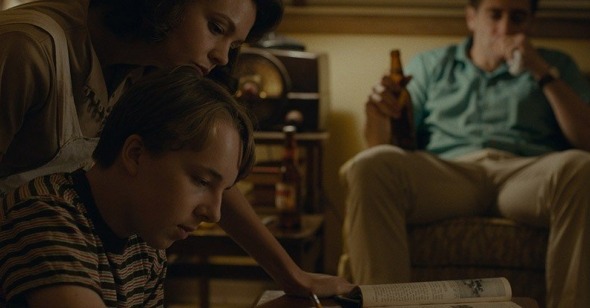Into the Fire
By Caroline Madden
Wildlife
Dir. Paul Dano, U.S., IFC Films
Midway through Paul Dano’s directorial debut Wildlife, Carey Mulligan’s despondent Jeannette Brinson, bundled in a soft, pink sweater with her curlers wrapped in a headscarf, paces with anticipation and confesses to her 14-year-old son, Joe (Ed Oxenbould), “I feel like I need to wake up, but I don’t know what from, or to.” Jeanette somnambulates through her ostensibly picturesque life in early 1960s Montana, her piece of the American Dream swiftly crumbling after her husband loses his job. Based on Richard Ford’s novel of the same name, Wildlife is a familiar tale of melancholic housewives and suburban discontent, as seen in Sam Mendes’s Revolutionary Road, Ang Lee’s The Ice Storm, or Matthew Weiner’s series Mad Men, but Dano’s delicate compositions and introspective script, co-written by Zoe Kazan, bring a distinct perspective that keeps the film from devolving into tedious or mawkish clichés.
Played with remarkable maturity by Oxenbould, who echoes a young Dano is his command of the screen, Joe watches the quiet dissolution of his parents’ marriage. He spends his evenings tossing a football with his father, Jerry (Jake Gyllenhaal), and finishing homework with the help of his doting mother before gathering around the dining room table for a warm, bountiful supper. These quaint tableaux of Joe’s cozy familial life are represented as halcyon without being saccharine. David Lang’s swirling score of wind instruments and pianos creates a somber yearning beneath such homely images, and cinematographer Diego Garcia’s expansive landscape shots of their tranquil Montana town, crossed by softly rumbling trains and nestled beneath vast mountains, offer a scenic elegance. Yet the town’s idyllic beauty and hushed stillness oppresses the Brinson adults and goads their restlessness.
Jerry is an affable golf course attendant who riles his boss after chumming with the affluent clientele and is subsequently fired. Refusing to work as a grocery store bag boy, which he considers a lowly job for teenagers, Jerry spends his days in a crestfallen haze lolling on the couch or in his car. He becomes prone to Willy Loman-esque lamentations about the upper echelons of society, those who “don’t want small people like us to get ahead.” Luckily, Jeannette has the stern resolution to pick up the shattered pieces of Jerry’s emasculated well-being by taking a job at the local YMCA. This is not the first time she has had to keep her floundering husband afloat during his unemployment. Much to her chagrin, Jerry eventually decides to leave the family and risk his life to fight the massive forest fires on the Canadian border for a mere dollar a day. Dano’s serene shots of Jerry leaving in the bed of a pickup truck with the wind rustling his hair and the sunset’s glow warming his face infer that he does not consider this a perilous endeavor but rather a liberating adventure freeing him from the oppression of his small-town life and domestic responsibilities. Gyllenhaal adroitly sketches a sad portrait of fractured manhood that lingers even in his character’s lengthy absence and explodes in a ferocious fury upon his return.
Like the timberland ravaged by the fire that his father goes off to fight, Joe’s Norman Rockwell existence quickly turns to cinder. Jerry’s departure ignites a rage in Jeannette that unfurls in poisonous tirades against him and belligerent, self-pitying monologues about her squandered opportunities and memories of youth. She stops cooking, wears new clothes, lies about her whereabouts, and disappears in the middle of the night. Her shocking candor and abandonment of household duties rattles Joe; he can hardly believe this impetuous figure was once his carefully composed and docile mother. Mulligan’s bravura performance exudes the oceanic misery that lies beneath Jeanette’s hardened exterior and uncouth behavior, preventing her character from becoming an unsympathetic harpy. Jeannette soon falls for Warren Miller, a wealthy car salesman played by a sly Bill Camp, who promises her the life of comfortable stability that the roving Jerry cannot provide. Dano constructs a supremely tense dinner sequence as Warren and Jeanette’s coquettish exchanges in front of Joe escalate into a startling carnality that he should not be privy to, completely destroying the image of loving family life he once knew.
The uncomfortable scene ruptures the gap between Joe and the surreptitious adult world that Dano studiously crafts; throughout Wildlife, he frequently keeps the interactions between adults off screen or in the distance and centers on Joe’s reactions, such as when he gapes at his father’s humiliating dismissal or sneaks a glance at his parents lovingly holding hands in the corner of the kitchen. Dano makes the best use of this concentrated methodology when he fixes on Joe’s horrified observation of something unspeakable through Warren’s window. After he runs away, the camera pans over to reveal the devastating sight, a gut-punch moment. Oxenbould’s bewildered reactions to his parents’ foibles anchor the film in a kind of awe.
It speaks to Dano’s own experience as an actor that he so generously endows his performers with the time and space to chart their characters’ emotionally intense arcs. Dano bends the contours of the coming-of-age drama by examining what is happening around his protagonist rather than to him. Joe’s transition from childhood to adulthood hinges on his distanced observance of his parents’ unraveled relationship. Wildlife is defined by the act of watching—Joe is a silent witness on the fringes of his own fractured lifs, and we see the metamorphosis of Jeannette and Jerry through his eyes. With patient pacing and expressive, measured use of close-ups, Dano masterfully registers the shifts in the Brinsons’ identities. Joe’s after-school job as a portrait photographer embodies the film’s themes and Dano’s assiduous gaze. Striving to capture nuclear family perfection with his subjects, Joe reaches for an unattainable ideal that disintegrates soon after the flashbulb pops.
